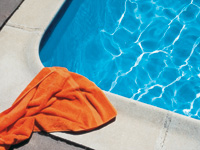Plenty of people spend time at the lake or pool to get relief from the heat, but water time can come with risks.
Every day, about 10 people in the United States die from an accidental drowning; an additional 330 people die each year from drowning in boating-related accidents, according to the Centers for Disease Control and Prevention.
Deaths like this can be prevented, said Capt. Bill Herold Sedgwick County Fire District No. 1.
Herold suggests families create safety plans to prevent an injury or death.
RESIDENTIAL POOLS
A residential pool, like at home, is were a majority of pool drownings take place. Safety experts say part of the reason is distracted parents who are talking on their phones, grilling, socializing or supervising other children. There needs to be a “water watcher:” a person with eyes on the water at all times, Herold said.
“An adult who basically 100% of their attention is focused on the children that are in the pools or in the spas,” he said. “They don’t play on their cell phones, they don’t talk with their friends. They actually pay attention to the children that are in the pool and they stay within arm’s reach.”
Experts suggest that the designated water watcher is rotated in-and-out of position every 15 minutes. This allows a fresh set of eyes to scan the pool.
WHAT DROWNING IS REALLY LIKE
Drowning can be a challenge to spot. ABC News recently asked families to join them for a story, where parents did not know they were being tested. Lifeguards simulated drowning in a pool during a party. Only one parent noticed a simulated drowning – after several others occurred at the party. One thing that may surprise some is the fact that drowning is hard to spot.
“It’s kind of hard for them to scream, so all you kind of hear is the splashing around,” Herold said of what it’s like for a victim. “It sounds like normal play with kids, so it’s really a silent killer for children because if you’re not paying attention and not watching them, they could drown in a matter of minutes.”
In addition to having a water watcher, Herold said it’s good to have a:
- Five-foot fence surrounding the pool.
- Self-latching gate surrounding the area – he personally prefers two latches
- Swim buddy for every person.
- Fire extinguisher for times at the lake, when a boat may catch on fire.
- Life jackets for everyone on a boat, and to be sure the jackets are properly fitted for each person. Herold said parents may let their child wear a size for too long, with it being too big or small, and that can make the device ineffective or dangerous to wear.
- Alarm for the pool. There are alarms that sit in the water and will sound if a person or object drops in. Herold said he’s found some that can send alerts to phones and said they are fairly inexpensive.
- Remove toys from pool area to reduce temptation to jump in unsupervised.
- Cover to go on top of pool or spa when not in use. It should be able to hold the weight of an average adult.
- Do not drink and swim – much like drinking and driving, it reduces ones ability of staying safe.

